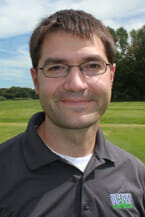Each month two speakers presenting at the 2020 National SFMA Conference and Exhibition in West Palm Beach, Florida will be featured. Don’t miss the educational opportunities offered at the conference!
 Dr. Beth Guertal is a Professor at Auburn University. On Wednesday, January 15, she will be presenting “Fertility Fact, Myth and Legend – Sports Turf Edition.”
Dr. Beth Guertal is a Professor at Auburn University. On Wednesday, January 15, she will be presenting “Fertility Fact, Myth and Legend – Sports Turf Edition.”
We’ve all heard them: ‘apply potassium for traffic stress’, ‘no late season N – it causes winterkill’, and, ‘adding gypsum alleviates traffic stress’. But is any of this true, or is it as mythical as unicorns? Come join in for a discussion of the facts, myths and legends that surround fertilization and soil management, and see which are supported by research.
Attendees will:
1. Understand the role of proper fertilization in soil and turfgrass responses.
2. Specifically see how fertilization with nutrients such as K or Ca can impact soil properties and/or turfgrass health.
3. Recognize the role of plant nutrition in integrated plant management.
 Dr. John Inguagiato is an Associate Professor at University of Connecticut. On Wednesday, January 15, he will be presenting “Improving Biological Control of Turfgrass Pests in the Wake of Public Opinion” with Dr. Joseph Roberts (University of Maryland).
Dr. John Inguagiato is an Associate Professor at University of Connecticut. On Wednesday, January 15, he will be presenting “Improving Biological Control of Turfgrass Pests in the Wake of Public Opinion” with Dr. Joseph Roberts (University of Maryland).
In recent years, fertilizer and pesticide use in turfgrass has become a public concern resulting in state and local laws mandating the use of these products. With a growing public concern for both human and environmental health associated with turfgrass management, there is a growing need for alternative management strategies. Turfgrass researchers are developing new research in this area, particularly with how it relates to turfgrass microbiology.
By attending this session, participants will:
1. Gain background knowledge in current trends of public opinion surrounding turfgrass pest control. Highlighting enacted legislation to limit tools used to manage turfgrass in addition to media growing public concern.
2. Gain an understanding of biological control, defining multiple pathways for controlling pests, what microbes are available, and how they work to improve turfgrass pest defense.
3. Aid in identifying key management hurdles that should be incorporated into future research projects aimed at harnessing microbiology to stimulate turfgrass health.